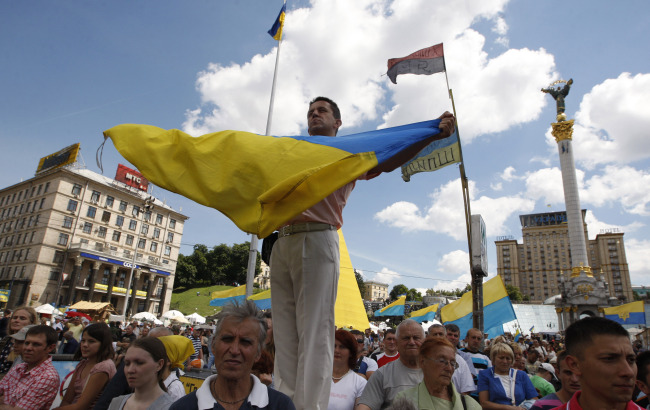Europe warns Putin of tough sanctions
French, German leaders seek to sustain peace moves in Ukraine
By Korea HeraldPublished : June 30, 2014 - 19:47
KIEV (AFP) ― With Ukraine’s shaky truce set to expire Monday, the leaders of Germany and France have warned Vladimir Putin that Russia could face punishing sanctions unless he forces the pro-Russian rebels Moscow is accused of backing to suspend their deadly uprising.
The French presidency said Francois Hollande and German Chancellor Angela Merkel made their case to the Russian strongman in a call on Sunday that stretched for more than two hours and included Ukraine’s embattled pro-Western leader Petro Poroshenko.
The new Ukrainian president’s office said the four agreed to speak again on Monday with the cease-fire expiring at 7 p.m. GMT and no end to 13 weeks of fighting in sight.
The Ukrainian military reported losing five more soldiers over the weekend.
Sunday’s teleconference ― the second in four days ― had been arranged in Brussels on Friday when Poroshenko put his name to a historic trade deal with Europe that broke Kiev’s extended bonds with Moscow.
The European Union also used the occasion to issue an unusually firm statement telling Putin that he had until Monday to put explicit pressure on the separatist gunmen in restive east Ukraine or face the possibility of entire sectors of Russia’s economy being cut off from the 28-nation bloc’s 500 million consumers.
The French presidency said Francois Hollande and German Chancellor Angela Merkel made their case to the Russian strongman in a call on Sunday that stretched for more than two hours and included Ukraine’s embattled pro-Western leader Petro Poroshenko.
The new Ukrainian president’s office said the four agreed to speak again on Monday with the cease-fire expiring at 7 p.m. GMT and no end to 13 weeks of fighting in sight.
The Ukrainian military reported losing five more soldiers over the weekend.
Sunday’s teleconference ― the second in four days ― had been arranged in Brussels on Friday when Poroshenko put his name to a historic trade deal with Europe that broke Kiev’s extended bonds with Moscow.
The European Union also used the occasion to issue an unusually firm statement telling Putin that he had until Monday to put explicit pressure on the separatist gunmen in restive east Ukraine or face the possibility of entire sectors of Russia’s economy being cut off from the 28-nation bloc’s 500 million consumers.

The United States has promised to move in lockstep with Europe on Russian sanctions in the Cold War-style confrontation over the future of the strategic ex-Soviet state.
The French statement said Sunday’s call stressed “the importance of new concrete steps to stabilize the security situation on the ground, the extension of the ceasefire and the implementation of the peace plan presented by the Ukrainian authorities.”
It also cited the EU’s punitive measures threat and said the three leaders told Putin they “hoped that results are achieved by Monday.”
The Kremlin’s account of the conversation made no mention of the European conditions and stressed the joint call for Poroshenko not to resume his eastern military campaign.
It also once again urged Ukraine to accept “immediate” Russian humanitarian aid in the conflict zone. Kiev suspects Moscow of planning to use such deliveries to smuggle arms to the rebel fighters.
The conflicting demands between Moscow and Kiev are also vividly reflected on the battlefield.
Separatist leaders say they will not engage in direct negotiations with Kiev until government forces withdraw from the heavily Russified east.
And Poroshenko refuses to meet rebel commanders who have “blood on their hands.”
The Western-backed head of state has also hinted that he may again resort to force should the guerrillas fail to disarm and cede control of state buildings across a dozen cities and towns.
Kiev and its Western allies accuse Russia of both arming and funding the militias in a bid to unsettle the new Ukrainian government as revenge for the February ouster of a pro-Kremlin president who had ditched the very EU agreement Poroshenko signed on Friday.
Ukraine’s worst crisis since its 1991 independence has now claimed 450 lives.
The possibility of the United States and Europe freezing access to Russia’s banking sector has already dented the country’s outlook and raised the possibility of the economy contracting for the first time since the 2008-2009 global financial crisis.
Russia’s economy minister warned on Saturday that new sanctions could “seriously” impact growth that the International Monetary Fund believes may only reach 0.2 percent this year.
But public statements in Moscow indicate it is busy preparing an economic counter offensive that would put up prohibitive barriers to Ukrainian trade.
Russian and EU ministers have tentatively agreed to meet on July 11 to discuss how Moscow’s concerns over the EU agreements signed by Ukraine and also Moldova and Georgia might be best addressed.
Ukraine’s commissioner on European integration said he expected the consultations with Russia to be acrimonious and possibly fruitless.
“Our neighbor has this desire to always act as our big brother, a mentor, to always try teaching us something,” Valeriy Pyatnitskiy told Kiev’s Dzerkalo Tyzhnia weekly.
The commissioner added that Ukraine may have no choice but to appeal to the World Trade Organization ― a global free commerce club Russia only joined in 2012 ― to step in as a broker of last resort.
-
Articles by Korea Herald







![[Graphic News] More Koreans say they plan long-distance trips this year](http://res.heraldm.com/phpwas/restmb_idxmake.php?idx=644&simg=/content/image/2024/04/17/20240417050828_0.gif&u=)
![[KH Explains] Hyundai's full hybrid edge to pay off amid slow transition to pure EVs](http://res.heraldm.com/phpwas/restmb_idxmake.php?idx=644&simg=/content/image/2024/04/18/20240418050645_0.jpg&u=20240419100350)






![[From the Scene] Monks, Buddhists hail return of remains of Buddhas](http://res.heraldm.com/phpwas/restmb_idxmake.php?idx=652&simg=/content/image/2024/04/19/20240419050617_0.jpg&u=20240419175937)

![[KH Explains] Hyundai's full hybrid edge to pay off amid slow transition to pure EVs](http://res.heraldm.com/phpwas/restmb_idxmake.php?idx=652&simg=/content/image/2024/04/18/20240418050645_0.jpg&u=20240419100350)

![[Today’s K-pop] Illit drops debut single remix](http://res.heraldm.com/phpwas/restmb_idxmake.php?idx=642&simg=/content/image/2024/04/19/20240419050612_0.jpg&u=)